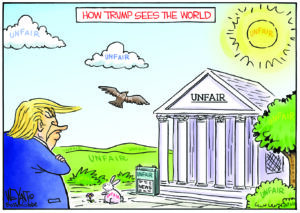Record Number of Women Run for U.S. House Seats
Most are Democrats motivated by anger at President Trump and policies of the Republican-controlled Congress.CHERRY HILL, N.J.—The number of women running for seats in the U.S. House of Representatives set a record Thursday, the vast majority of them Democrats motivated by angst over President Donald Trump and policies of the Republican-controlled Congress.
Their ranks will continue to grow in the weeks ahead, with filing deadlines still to come in more than half the states.
In many places, women are running for congressional seats that have never had a female representative.
“It’s about time,” said Kara Eastman of Nebraska, one of two Democrats vying to challenge a Republican incumbent in a district centered in Omaha.
A surge of women into this year’s midterm elections had been expected since the Women’s March demonstrations nationwide just after Trump’s inauguration in January 2017. Numbers analyzed by The Associated Press show that momentum is continuing.
After Virginia released its candidate list Thursday, a total of 309 women from the two major parties have filed candidacy papers to run for the House. That tops the previous record of 298 in 2012.
The AP analyzed data going back to 1992 from the Center for American Women and Politics at Rutgers University and did its own review of candidate information released by the states.
While just over half the nation’s population is female, four out of every five members of the U.S. House are men. The women’s candidacies won’t necessarily change that. They still have to survive party primaries and win the general election, often against an incumbent with name recognition and a large reservoir of campaign cash.
Even with the record numbers, women are still outnumbered by male candidates. But experts say the sheer number of women running combined with so many House seats open due to retirements or resignations provides one of the best opportunities for women to make real gains in terms of representation and a change in priorities.
Many of the female candidates have focused their campaign messages on health care, education, early childhood development, family leave and workplace equality.
Eastman said she was motivated by Republican attempts to cut health coverage for low-income people and rollbacks of environmental protections.
She decided to run after her mother, who has since died, was diagnosed with cancer for the fifth time and saw her prescription drug prices soar even though she was covered by Medicare.
“It’s a great thing for me to show my 16-year-old daughter,” Eastman, who runs a children’s health care nonprofit, said of her candidacy.
___
Linke is an Associated Press visual journalist who reported from Washington, D.C. Associated Press writer Christina A. Cassidy in Atlanta contributed to this report.
Your support matters…Independent journalism is under threat and overshadowed by heavily funded mainstream media.
You can help level the playing field. Become a member.
Your tax-deductible contribution keeps us digging beneath the headlines to give you thought-provoking, investigative reporting and analysis that unearths what's really happening- without compromise.
Give today to support our courageous, independent journalists.






You need to be a supporter to comment.
There are currently no responses to this article.
Be the first to respond.